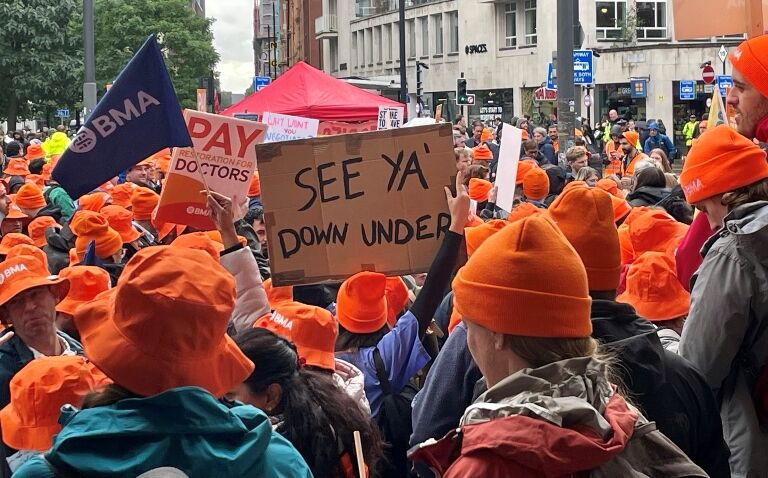Junior doctors will strike for six days this week, marking the longest consecutive strike action taken in NHS history.
As a result, NHS England has warned it could be ‘one of the most difficult starts to the year‘ the health service has ever experienced with this latest strike action exacerbating pressures caused by seasonal illnesses and staff absence.
Health leaders have also said trusts will be ‘skating on the thinnest of ice’ and that patient safety will be put at serious risk.
The strike began at 7am on Wednesday 3 January and will end at 7am on Tuesday 9 January – a total of 144 hours of uninterrupted stoppages.
The NHS Confederation highlighted that this will lead to thin rotas and local services being placed in highly vulnerable positions.
Rising levels of flu, norovirus and Covid-19 in hospitals combined with higher staff absences due to Covid will also heighten the risk, it said.
Hospitals will prioritise urgent and emergency cases as consultants cover striking junior doctors – the most recent period of action resulted in ‘thousands’ of postponed appointments.
Despite pressures, NHSE has encouraged people to continue using 111 online, GP services, and A&E in emergency situations.
NHS England’s national medical director Professor Sir Stephen Powis said: ‘This January could be one of the most difficult starts to the year the NHS has ever faced.’
Despite ‘extensive preparations’, he warned that NHS staff are starting the new year ‘on the back foot’, and the industrial action ‘will continue to have a serious impact in the weeks after’.
In the week to 24 December 2023, there were an average of 942 patients with flu in hospital each day, including 48 in critical care. That is almost six times higher than the 160 patients the previous month and over double the 402 from the week before.
An average of 452 patients were in hospital with norovirus each day, which is 61% higher than the 281 patients the same week in 2022.
There were also 3,620 patients with Covid in hospital on 24 Dec, up 59% from 2,275 the month before.
Strike recall for major incidents
Junior doctors voted for these strike dates at the start of December, along with three strike days in the run up to Christmas, after rejecting the Government’s pay offer – this followed five weeks of ‘intense negotiations’.
BMA junior doctors committee co-chairs Dr Robert Laurenson and Dr Vivek Trivedi said: ’We spent the holiday period hoping we would get the “final offer“ that the health secretary had promised us last year.
’Sadly, we have received no such offer despite repeatedly saying we would meet for talks any time over Christmas. We will continue to offer to meet throughout these coming strikes. All we need is a credible offer we can put to members and we can call off these strikes.’
The British Medical Association (BMA) and the Government were unable to agree to national derogations for the January strikes, but there is an agreement in place whereby junior doctors can be recalled for major incidents and extreme circumstances.
The Confederation said NHS leaders are calling on the BMA to respond to requests for junior doctors to be recalled and for the judgement of senior managers to be trusted when they say they need urgent cover.
Matthew Taylor, chief executive of the NHS Confederation said: ‘Many NHS trusts will have thin rotas and will be in a highly vulnerable position as they enter what is widely regarded as the busiest week of the year for local NHS services. Parts of the NHS will be skating on very thin ice, and they will need the BMA to back any recall requests for junior doctors when services find themselves under extreme pressure.’
He added: ‘To face almost 150 hours of continuous stoppages is a serious and unprecedented risk – and one that NHS leaders and their staff have never experienced before. The good news is that the NHS has again prepared extensively and has had to become adept at planning for strikes.
‘While they will again do all they can to mitigate the risks, especially for patients needing emergency care, they have again been left with no choice but to schedule in less activity in anticipation of the strikes. That means more delays for patients who have faced lengthy waits for routine treatment.’
In October, NHS England formally warned the BMA about the ‘cumulative’ impact of the doctor strikes which were causing ‘significant disruption and risk to patients’.
In November, the BMA and Hospital Consultants and Specialists Association (HCSA) reached an agreement in principle on a pay offer of 4.95% that could bring an end to consultant strike action.
A recent Health Foundation report found that the NHS waiting list will reach a high of eight million in the summer of 2024 if current trends continue, regardless of strike action.










